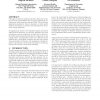Free Online Productivity Tools
i2Speak
i2Symbol
i2OCR
iTex2Img
iWeb2Print
iWeb2Shot
i2Type
iPdf2Split
iPdf2Merge
i2Bopomofo
i2Arabic
i2Style
i2Image
i2PDF
iLatex2Rtf
Sci2ools
133
Voted
SIGMETRICS
2000
ACM
2000
ACM
An analytical model of the working-set sizes in decision-support systems
This paper presents an analytical model to study how working sets scale with database size and other applications parameters in decision-support systems (DSS). The model uses application parameters, that are measured on down-scaled database executions, to predict cache miss ratios for executions of large databases. By applying the model to two database engines and typical DSS queries we find that, even for large databases, the most performance-critical working set is small and is caused by the instructions and private data that are required to access a single tuple. Consequently, its size is not affected by the database size. Surprisingly, database data may also exhibit temporal locality but the size of its working set critically depends on the structure of the query, the method of scanning, and the size and the content of the database.
Related Content
| Added | 01 Aug 2010 |
| Updated | 01 Aug 2010 |
| Type | Conference |
| Year | 2000 |
| Where | SIGMETRICS |
| Authors | Magnus Karlsson, Per Stenström |
Comments (0)

